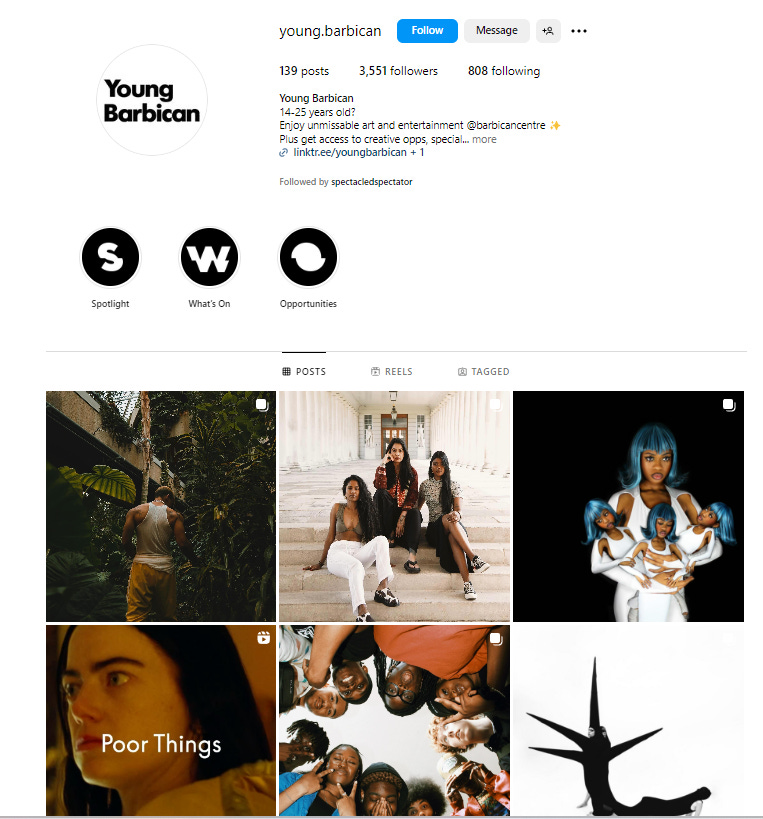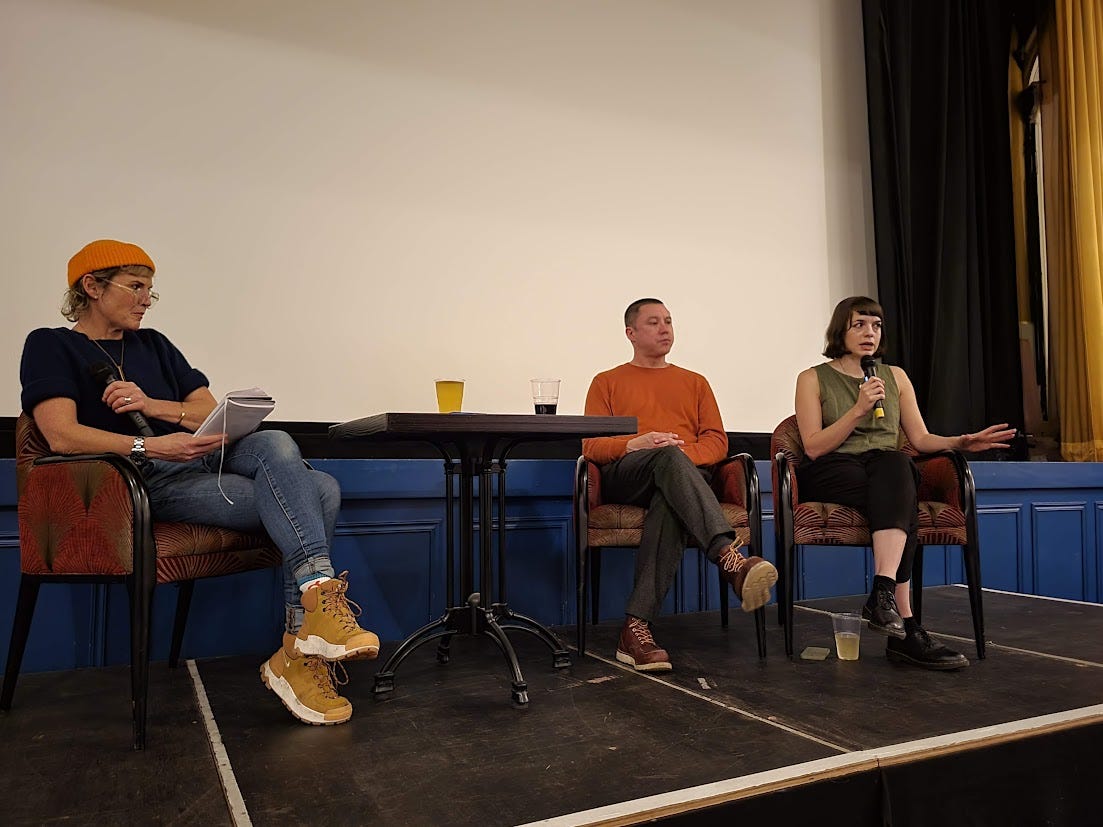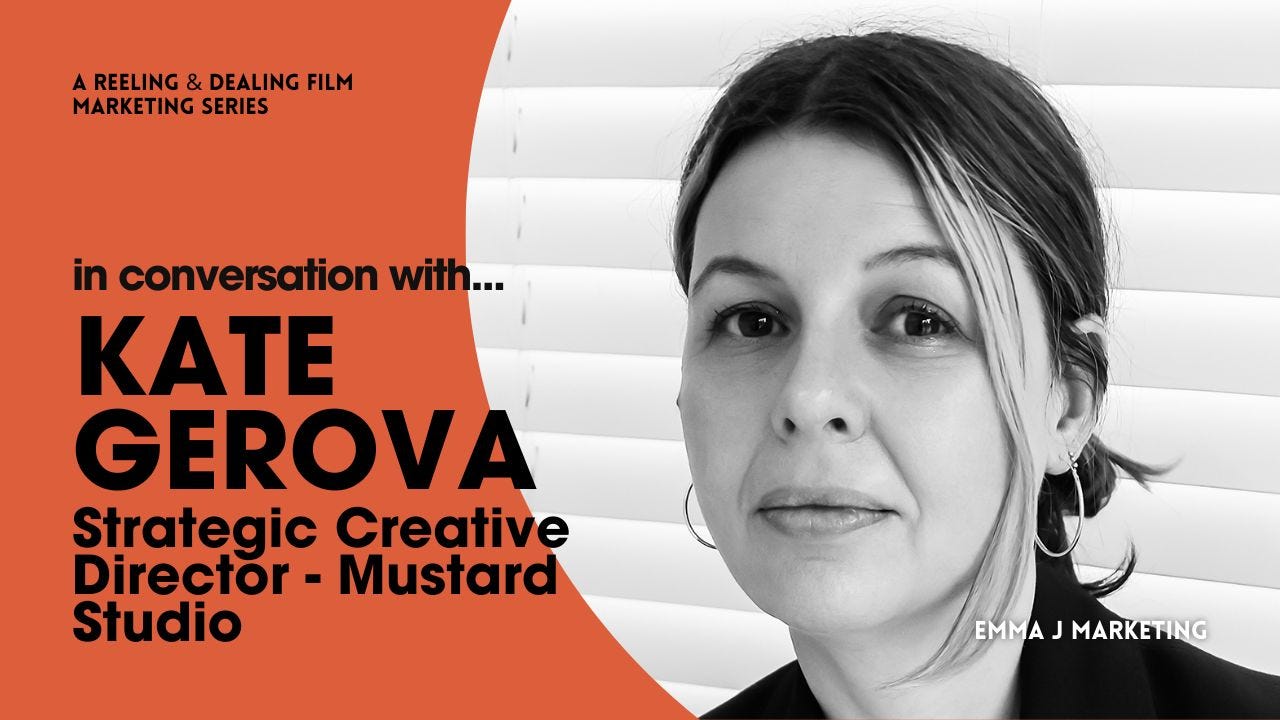In conversation with... Kate Gerova
Mustard Studio's Strategic Creative Director on building and retaining cinema audience, and changing audience habits
Well my little Bikeriders, it HAS been a while! My woefully neglected Substack is BACK, following a ridic busy work period, with another juicy interview edition!
Today I’m sharing some excellent industry insights all about audience building, and how to keep cinema audiences engaged, informed, and drive frequency! My guest with the knowledge is the delightful Kate Gerova, Strategic Creative Director at Mustard Studio - a marketing and brand-building studio dedicated to the cinema and film sector.
Kate Gerova has over 25 years of experience in the film industry. As well as distribution, Kate's diverse career includes roles with film festivals, and at CURZON cinemas. In 2020, she co-launched Mustard Studio with Mandy Kean, focusing on marketing and brand building in the cinema and film sector. Mustard Studio works across audiences, campaigns, and cinema development, helping to drive audience engagement and innovative marketing strategies.
*Note - this is an edited version, our full conversation can be found on Youtube here ⤵️
Emma: Kate, thank you for joining me! It’s been a bit of a turbulent time for cinemas over the past few years, but there are positive noises in the industry, notably at the recent CineEurope conference in Barcelona.
What is the current state of the cinema sector when it comes to audience?
Kate: Well, according to the recent research (November ‘23), about 82% of cinema-goers have returned post-pandemic, but we're still missing 18% and it’s mainly older audiences. Younger audiences have come back which is great, but there we have a frequency challenge. People are not visiting as often as they did before the pandemic. The habit of cinemagoing has been lost, so as a whole the sector needs to look at how we attract older people back, and how we then drive overall frequency.
Another big challenge is that the same report shows 31% of people have no idea about the upcoming film slate, which is a significant increase from pre-pandemic times. So, awareness is a major issue - there’s discrepancy in communication about films.
If we think about the things that have worked phenomenally well in the last year, things like the Taylor Swift concert film, or Beyoncé, everyone knew when they were coming. You couldn't move and not know the date. I mean, a toddler would have known the dates, you know?
Emma: Like Barbenheimer, you could have zero interest in film and still know exactly when that was coming out! It was everywhere, 24/7.
Kate: Yes, so I wonder if we're doing enough to communicate film slates, generally, not just tentpoles. There are a lot of nuanced factors affecting the industry right now, rather than one big “sexy headline” issue!
Emma: Yes, and sadly simplified “sexy” headlines don’t answer complex problems, we need detailed insights! So really it seems like the big blockbusters are cannibalising smaller films in terms of market attention, preventing them from having a chance. How can cinemas create better awareness and attract audiences for those smaller films?
Kate: It's about finding the right balance. Big films like Barbie dominate the marketing space, but smaller films need more innovative marketing strategies. For instance, engaging local communities and creating personalised experiences around film can help.
We know from younger people that well-placed trailers plays a big part in how they discover indie / smaller films, but also bus sides, out of home. Not just social media. So encouraging cinemas to show indie trailers alongside blockbuster fare could help.
Emma: Interesting, as again headlines would have you believe it’s ALL social media. But there’s still value in traditional media spend.
Kate: Yes, Cinemas should emphasise their unique personality and the overall experience they offer audiences, not just the films. Sharing the things that make their space unique, what you can’t get at home. But also one major challenge for cinemas is resource. A lot of the cinemas that we work with, they are really full of very talented and smart people with loads of ideas, but can be limited by resource.
Emma: Agreed. What cinemas are doing really good things to drive audience engagement?
Kate: So the Barbican in London, for example, does a lot of local area marketing to the residents and offices in the immediate surrounds, subsidised tickets including a young people’s membership, and has a young programmers' group, making it inclusive. That works because there’s both a local audience and workers, and students is an audience that refreshes regularly, etc.

For other cinemas - say in areas where maybe you’re the only screen and no competition, it’s more about retaining your existing audience and improving frequency of visits, so having a robust loyalty programme in place, giving back to the community in some way.
We worked together on the TISH film release together (Paul Sng 2023) and as you know, getting audiences in is not just about reaching out to people, sharing assets, and getting the cinemas to share content. That's something they can always do, but ultimately it's also about taking the cinema to the audience first, by which I mean you have to give, give, give - and then you ask for something.
There are people who want to but can't go to the cinema. Sometimes with a small indie film, the show times will be 2 pm. Or 8.30 pm. And that might not work for a lot of people. You have to ask your audience: Can you go to this film? If it’s 8.30 pm, that means 9 pm start, so you'll be home after 11 pm. Have you got a babysitter? Cinemas need to think about this.

Emma: Yes, adapt to the audience’s needs. There’s a lot of changes in how cinemas communicate to audiences since the pandemic. Maybe that’s a reason for the dip in knowledge about the film slate?
Kate: Well, in the pandemic, lots of cinemas stopped doing their magazines - for very good reason. You know, a magazine is not particularly green. A magazine costs money to print. There's so many reasons not to do a magazine.
But… People love cinema magazines! They love getting them and they love reading about what's coming up and it's such a nice entry point.
But you can’t just say, “I think everybody should go back to producing cinema magazines” because it just doesn't feel like a very sustainable option, but it’s not a straightforward decision.
Emma: I think you're right, it has to be case by case. Cinemas really have to consider if it will it pay off to keep having a magazine. Everyone says that everything should be digital and online, but sometimes I think, should it? Or is that just the assumption because that's the direction globally is going?
I worked on the French Film Festival and we reduced the number of brochures because of our sustainability concerns. But we heard from a number of disappointed loyal audience members (the FFF audience skews a bit older), and they really valued having the printed brochure. They didn’t want to be trying to find out what, where and when films were screening on their phones or laptops.
They wrote to us, “We want the brochure. I want it in my handbag so I can read it on the bus, or I can read it at the hairdresser. I can sit on a Sunday and go through it and circle all the things I want to see.” And so, actually, the decision was to expand the limited number we had printed because it was more worth our while putting money into doing that than spending more money doing flashy promos on our website.
Kate: I think that's such a great example, Emma. I really do. And the thing is, I think because we make these assumptions, it's like, who has the right to film culture? Is it only people who can get on an app?
Emma: I have also been guilty of being too quick to make assumptions in marketing, because there’s so much noise and soundbite statements about audiences, about this trend or that. But - as always - success boils down to the most 101 marketing lesson of all: Listen to your audience. They're telling you what they want all the time.
Kate: Literally, that's the whole theme of this conversation!
Emma: When I saw that stat about young people being driven to see films because of trailers and billboards, I fell off my chair, because it's drummed into us from morning ‘til night: Gen Z = Tik Tok. Gen Z = social media. They're all on YouTube.
And yes, there's enough stats that indicate that is one pathway, but the problem we have is blanket assumptions because of - like you said right at the start - “sexy headlines”, and sexy headlines are blinding a lot of people from doing proper audience research or listening to people.
I think that's a huge challenge from the marketing side. I don't want to say people are getting lazy, but it's almost like there are so many big, loud headlines that we forget to do the fundamental basis of localised audience research. Yes, there’s a general trend, but what does my specific audience need at the end of the day?
What other changes are you seeing in audience habits since the pandemic?
Kate: There's definitely a trend of younger people attending more art house movies and repertory classics, which is heartening. It shows that audiences are nuanced, and there's a market for both new and classic films.
You know, so I think the sort of films like Passengers, Priscilla. So that has been something exciting. I think A24, for example, have really kind of driven this and I love that, it actually fills me with hope, because there is so much wealth of film to discover. And I think that's interesting is that people want to rediscover older films too. And again, I think it just proves that audiences are very nuanced and that we can't just put labels on any age group. Not the younger, not the older. Because people, if you love film, you love film, you know?
Emma: That’s a positive note to end on. Audiences are eager to return; we just need to listen better to what they want, and adapt to their needs. Thanks Kate, for your great insights!
Kate: Thank you, Emma. It’s been a pleasure.
_______________________
To find out more about the work Mustard Studio does, hit their website.
Back next week with my regular round-up of everything movie marketing, trends, news and movers & shakers - including a breakdown on Neon’s AMAZING ‘LONGLEGS’marketing strategy.




